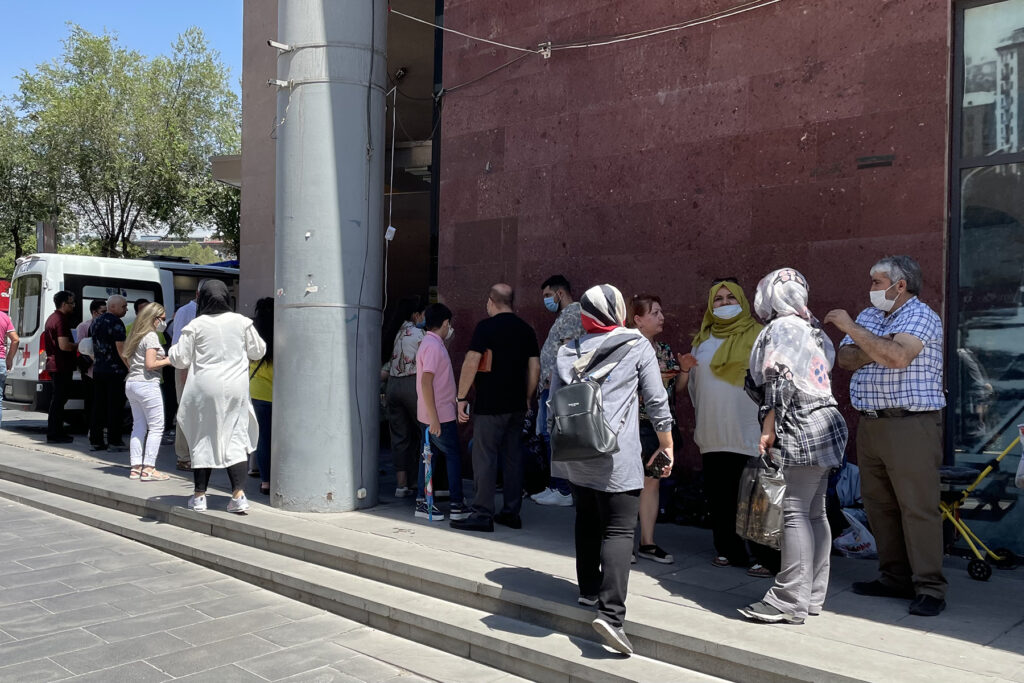Vaccination against COVID-19 in Armenia began in April 2021, due to low uptake, it was quickly opened up to all adults — including foreigners. While initially causing long queues and crowding on the Iranian border, as of now Armenia appears to have developed an effective model of vaccine tourism.
‘I'm afraid of infection’, Elvin Panosyan, a 33-year-old Iranian who came to Armenia to get vaccinated, told OC Media. ‘There are many deaths in Iran today.’

Elvin came to Armenia with her friends, they, like thousands of their compatriots, have come to Armenia to seek vaccination which they could not receive in their home country.
Iran has been battered by COVID-19, the country, which has a population of 80 million was one of the first countries in the world to be hit by the initial wave of the pandemic, and in recent months has been swept up in a new wave of Delta variant infections. As of September, over 100,000 have died.
Despite the ravages of the virus, Iran’s vaccination program has remained sluggish. It is limited only to the elderly and requires a cumbersome registration process — for those willing to make the journey, Armenia has become a welcome salvation. Meanwhile, for Armenia, the stream of Iranians flooding across has been a welcome influx of tourist dollars.
Vaccination for all
Three types of vaccine are currently used in Armenia: the Russian-made Sputnik V, Britain-Sweden-developed AstraZeneca and Chinese-made CoronaVac. Foreigners are only eligible to receive AstraZeneca and can be vaccinated in mobile vaccination stations throughout the country.
According to the Armenian Health Minister Anahit Avanesyan, only AstraZeneca has been made universally available as it is the most abundant of the three vaccines.

While universal vaccination went smoothly for the first several months, with vaccines being given on a first-come-first-serve basis, by July that process degenerated into chaos. By July, hours and sometimes days’ long queues formed at the Armenia-Iran border, while prospective vaccine recipients would effectively camp out at vaccination stations in the hopes that they could get one before the day’s supply ran out.
‘Before me, my sister came with her family to get vaccinated, and they waited in line for two days, but their turn didn’t come, then she realised that people sell spots in the queue for money’, a woman from Iran, who requested not to be identified, told OC Media. She said she had paid money to another person in the queue so she and her relatives could be vaccinated. Otherwise, she said, she would be in the queue ‘for another week’.
On July 15, in order to deal with the new influx of vaccine recipients, Armenian authorities brought in a new process. Instead of first-come-first-serve, anyone receiving a vaccine now had to register online. Those who were not citizens or residents of Armenia also had to prove that they had been in the country for at least 10 days before they could receive the vaccine.
‘There are no queues now, it may be a little difficult to stay here for 10 days, but the important thing is to get vaccinated, which saves lives. I am ready to pay twice as much as I did before, just to avoid arriving at death’s door’, the Iranian woman said.

For some, it is the fact that Armenia allows foreigners to receive AstraZeneca — which, unlike Sputnik V or Chinese-made vaccines, is recognised in most Western countries — that lures them to the country.
Eighteen-year-old Zahra Houman told OC Media she came to Armenia to get vaccinated because she will be leaving for studies in Canada soon. ‘In Iran, even if I could have the priority to get vaccinated, I would still have a problem’, she said. ‘I need to be vaccinated with a vaccine that is also accepted in Canada.’
Majority of jabs go to locals
While thousands of foreign citizens have been vaccinated in Armenia, according to statistics from the Ministry of Health, the overwhelming majority of vaccine recipients in the country have been Armenian citizens.
Armenia has administered 300,000 doses of the COVID-19 vaccine so far, with roughly 5% of Armenia’s population fully vaccinated against COVID-19.
For now, it seems that officials in Yerevan are happy with the country’s model of vaccine tourism, though Health Minister Avanesyan stresses that the authorities have a ‘flexible’ model that is subject to change. But if such a decision is made in the future, she said, it will be ‘announced in advance’.
Those coming to the country to get vaccinated appear satisfied too.
Twenty-seven-year-old Farzin Muyarat, who travelled to Yerevan from Vienna said that the 10-day minimum stay was a good opportunity to meet with Iranian relatives who also came to Yerevan.

‘We are all together — me, my wife, and our parents. It’s not bad at all, we are enjoying ourselves’, he said. ‘Sure, it’s expensive, we came with a big family. But I don’t complain, we are vaccinated for free and don’t have to wait in queues.
Muyarat added that he has many friends who have also come to Armenia or are planning to, both to get vaccinated for free and, at the same time, ‘enjoy a vacation’.




 8 September 2021
8 September 2021




